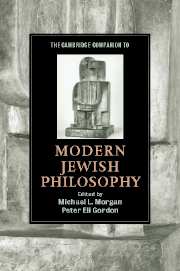Book contents
- Frontmatter
- 1 Introduction: Modern Jewish Philosophy, Modern Philosophy, and Modern Judaism
- 2 Baruch Spinoza and the Naturalization of Judaism
- 3 The Liberalism of Moses Mendelssohn
- 4 Jewish Philosophy after Kant The Legacy of Salomon Maimon
- 5 Hermann Cohen: Judaism and Critical Idealism
- 6 Self, Other, Text, God: The Dialogical Thought of Martin Buber
- 7 Franz Rosenzweig and the Philosophy of Jewish Existence
- 8 Leo Strauss and Modern Jewish Thought
- 9 Messianism and Modern Jewish Philosophy
- 10 Ethics, Authority, and Autonomy
- 11 Joseph Soloveitchik and Halakhic Man
- 12 Emmanuel Levinas: Judaism and the Primacy of the Ethical
- 13 Emil Fackenheim, the Holocaust, and Philosophy
- 14 Evil, Suffering, and the Holocaust
- 15 Revelation, Language, and Commentary: From Buber to Derrida
- 16 Feminism and Modern Jewish Philosophy
- Bibliography
- Index
16 - Feminism and Modern Jewish Philosophy
Published online by Cambridge University Press: 28 September 2007
- Frontmatter
- 1 Introduction: Modern Jewish Philosophy, Modern Philosophy, and Modern Judaism
- 2 Baruch Spinoza and the Naturalization of Judaism
- 3 The Liberalism of Moses Mendelssohn
- 4 Jewish Philosophy after Kant The Legacy of Salomon Maimon
- 5 Hermann Cohen: Judaism and Critical Idealism
- 6 Self, Other, Text, God: The Dialogical Thought of Martin Buber
- 7 Franz Rosenzweig and the Philosophy of Jewish Existence
- 8 Leo Strauss and Modern Jewish Thought
- 9 Messianism and Modern Jewish Philosophy
- 10 Ethics, Authority, and Autonomy
- 11 Joseph Soloveitchik and Halakhic Man
- 12 Emmanuel Levinas: Judaism and the Primacy of the Ethical
- 13 Emil Fackenheim, the Holocaust, and Philosophy
- 14 Evil, Suffering, and the Holocaust
- 15 Revelation, Language, and Commentary: From Buber to Derrida
- 16 Feminism and Modern Jewish Philosophy
- Bibliography
- Index
Summary
INTRODUCTION: FEMINISM, PHILOSOPHY, AND JEWISH PHILOSOPHY
The interactions between feminism and philosophy, and feminism and Judaism, have undergone serious development in recent decades. Starting with the former, many feminists have argued that Western philosophy has systematically excluded women. More specifically, feminists have argued that what Western male philosophers have presented as “essentially human” is in fact rooted in the male experience and does not reflect women’s experiences; that because the (male) ideals of reason were formed completely without female input, the Western philosophical tradition is thus biased; and that many philosophical works, written by men, contain numerous misogynist statements. In a similar vein, feminist theologians have maintained that Western religious traditions have systematically excluded women’s voices; that religious institutions have been predominantly male-oriented and reflect male concerns and priorities; and that many canonical religious texts, written almost exclusively by men, contain misogynist statements.
That feminist philosophers and theologians have risen to the challenges raised by an androcentric philosophical and theological canon has been well-documented. Jewish feminists as well, influenced by their feminist peers, have begun to level significant attacks against what they see as a Judaism entrenched in patriarchal institutionalism. This patriarchy is perhaps best expressed by Judith Plaskow in her seminal work Standing Again at Sinai: “Underlying specific halakhot … is an assumption of women’s Otherness far more basic than the laws in which it finds expression …men – and not women with them – define Jewish humanity. Men are the actors in religious and communal life because they are the normative Jews.
- Type
- Chapter
- Information
- The Cambridge Companion to Modern Jewish Philosophy , pp. 324 - 348Publisher: Cambridge University PressPrint publication year: 2007
- 1
- Cited by



